- Home
- Michael Grant
BZRK: Apocalypse Page 9
BZRK: Apocalypse Read online
Page 9
Bug Man wasn’t sure he liked that. On the other hand, he wasn’t sure he could argue the point. Was he without a moral core? He frowned, considered it, shrugged it off—figuring that if he couldn’t think of a good counterargument, maybe it meant she was right.
So he said, “Thank you. George said you weren’t part of BZRK.”
“Hmmm. Well, at that point I wasn’t sure we should meet, you and I. Yeah. You’ve extracted the sample?”
“The cells? Yeah, I got the Pope’s cells out. They’re with my nanobots on the Pope’s sleeve.”
“Yes, which goes to the laundry where it will be intercepted by someone working for … well, us.” She said the plural pronoun mockingly. As if it made no sense.
The alarm bells were going crazy now. Bug Man almost felt the floor tipping beneath him. Lystra laughed, almost as though she could read his mind.
“Ah, suspicion begins to form, yeah,” Lystra said. “See how quick you are? That’s why I like you. I’m done with you, I mean you’ve done what … we … wanted you to do. You harvested the cells. And I thought maybe, yeah … we … would just kill you now.”
Bug Man froze. The playful tone was more frightening than a threat. An overt threat might ring false, might be a bluff. But this woman was not bluffing. She could have him killed.
“Here you are, though, a young man without a place to go. So very many people, yeah, want you dead.”
His throat was dry, and the first words came out in a rasp. “What do you …” He swallowed, tried to get some moisture going.
“What do I want?” She sighed. The sigh was melodramatic and false. “Do you know the difference between us, Bug Man? Aside from the obvious—gender, age, race. We both know none of that’s important. The real difference between us is that you are a superb game player. Whereas I am a game designer.”
“Yeah? What game?”
“This one. Yeah. The game I call BZRK. Nanobots and biots. On the one side, twisted idealist freaks who would deprive humans of free will in order to give them all contentment. On the other hand …” She let it hang, then added a superfluous, “Yeah.”
“That’s the Twins’ game,” he said dully.
The not-very-convincing mask of friendliness disappeared so suddenly and so completely that it must never have been there. He had the terrifying impression that the skin on her face had shrunk so that bone and teeth and the hollows of her eye sockets were all suddenly outlined and shadowed.
Her eyes glittered. “Oh, them,” she said, striving to regain her jokey tone and failing. “They have their game. Mine is better. More levels.”
He noted that she no longer used the plural. Not our game. Mine.
She stood up suddenly. “Get dressed. I’ve decided. You’re coming with me.”
“But … where? Why am I—?”
“Where? Oh, places with tall buildings. New York City. And then cold, cold places. As cold as it gets this side of the grave. But what do you care, Bug Man?” She sounded weary now. “Don’t you want to see how the game plays out? Don’t you want to know what it was all about?”
He shook his head slowly. “Games aren’t about anything. Games are just about the game.”
She leaned down and laid a soft palm against his cheek. “See? That’s why I like you, Anthony Bug Man. You and I are going to be friends. Or I can have George put a bullet in your head.”
“Friends,” he said.
And Lear smiled.
TEN
Nijinsky was shopping when it happened.
He was at Saks, the big one, the flagship store on Fifth Avenue. Christmas was coming and he had nephews. But he was shopping more for himself than for them. He liked shopping. It was a Zen thing for him. He had an eye for style, which had been useful in his life as a model but was entirely neglected in BZRK.
Saks was already in full Christmas swing, decorated in a fantasy of silver and white; the storefront windows were dioramas of highly stylized snowmen appearing in Russian-themed settings. There were delicate flights of abstract snowflakes arched across the ceiling, and a restrained seasonal soundtrack played unobtrusively.
Nijinsky lifted the leg of a pair of slacks, felt the weight of the wool, ran sensitive, knowledgeable fingertips along the crease and then inside the waistband.
And to no one he said, “What?”
He froze, just stood there, seeming to stare at a mannequin dressed in a sleek but uninspired Canali suit.
“The hell?” Nijinsky said.
“Are you finding what you’re looking for?” It seemed an almost philosophical question, but of course it was just a salesperson, a woman, blonde, well put together but with tired eyes.
He stared at her now, just as blankly as he’d stared at the mannequin. “Something …” he said.
“Are you all right, sir?”
He was not all right. Nijinsky had four biots. One was in Burnofsky, in his eye, tapping the nerve and watching the computer upon which Burnofsky was busily typing. The others were in their crèches—holders for dormant biots—in the basement of the safe house. All were out of range, so that rather than seeing detailed pictures of what they saw, he was seeing something more like two open picture-in-picture displays with vague shapes, fuzziness, lack of detail. Like looking through a very dirty window at a poorly lit scene.
Except that now, suddenly, there was another window. And this one was perfectly clear.
A new biot.
He looked around then, frantic, searching for an explanation. A fit, attractive middle-aged man was trying on an Armani blazer. Two children and their nanny killing time, the kids playing tag around hanger racks. An attractive woman with ornate ink peeking out of her décolletage. Clerks. An older man; a store display designer carefully placing a hat on a mannequin.
“Sir?” the blonde saleswoman prompted.
Nijinsky shook his head. “No. I don’t think I am all right.”
The saleswoman said nothing to that.
And then, a second new window, as clear as the earlier one. A clear biot’s-eye view of the interior of a glass tube. He could see the curvature, the texture—like stretch marks somehow—because nothing was entirely smooth down at m-sub level.
Without so much willing it as thinking it, he turned the two new biots. They moved, obeying his will. And both biots now saw his opposite: six-legged; insectoid, but with dangerous tail stingers; a spider’s spinnerets; and the disturbing biot rendering of his own eyes, a nightmare twisting of his own face.
Biots. Two of them. And suddenly he understood.
He had seconds left.
“Excuse me,” he said to the saleswoman. “I believe I’m about to go mad. You may want to move away.” He pulled out his phone and opened his messaging app. Who? Who should he tell?
Should he even bother? Plath had pushed him aside. Why should he help her now?
He keyed in her phone number, hit the button for text, and typed.
There was a sudden rush of liquid rolling down the inside of the tube. It was no more than a droplet in the real world, but it was as big as a house in the m-sub.
“Ah,” he said, as the acid engulfed both his new biots.
The next thing he said was also, “Ah,” but this time he shouted it.
And the next “Ah” was screamed.
And the next twenty or so.
He broke into a run—frantic, terrified, still clutching the phone with its typed but unsent message.
“No! No! No!” he shrieked as he raced to the open escalator and threw himself down it. Threw himself, as if he was trying to fly. Arms outstretched, face forward.
He hit the steel steps, and his face exploded in blood. He climbed to his feet but was pulled off-balance by the moving stairs and pirouetted down until he landed again, hard.
But not hard enough to kill himself.
Nijinsky swung around, off the bottom of the escalator, and this time he had a plan, a mad, desperate plan, one he could barely hold on to. He tied his long scarf i
nto a knot as he descended a second, upward-bound escalator.
People ran out of his way, bounded up the steps to avoid him. They yelled things like, “What the hell, man?” But mostly they just got out of his way.
Nijinsky knelt on the stairs. Rising, rising, and lay the end of his silk scarf on the step before him.
Five seconds.
Four.
A wild, giggling shout rose from his throat as the end of the scarf was sucked into the escalator. The shout ended abruptly as the relentless mechanism devoured the scarf, tightened it around his neck, slammed his bloody face into the steel, chewed up his left hand, cut off his air.
He could no longer speak. No longer scream. Blood filled his head, and still the noose tightened.
His windpipe was crushed. Blood now seeped from his eyes and ears. The phone fell from his fingers and lay with message unsent on the steel serrated edge of the escalator.
By the time some bright shopper thought to push the emergency-stop switch, Nijinsky was dead.
The message on Plath’s phone was from Nijinsky.
It read, 2 new biots.
But she had muted her phone and would not see the message until later because she was meeting with Stern. Again.
Plath did not ask Keats to join her this time. She would discuss the Tulip with Mr. Stern, but she would mostly be asking him what he had discovered about Lear.
Attempts to learn about Lear counted as treason within BZRK. Treason led to bad things, and she did not want to implicate Keats in that.
Of course, Keats had a biot in her brain. If he was very curious he could make the long trip out into an ear canal and listen in.
She didn’t think Keats did things like that. It would be out of character. But in this new world she had entered such things had to be considered. In this new world the human body was not a singular object—it was an ecosystem. It was a Brazilian rainforest full of flora and fauna, from creepy, crawly mites to big, fat balls of pollen to Dr. Seuss–like fungal trees, to a hundred different types of bacteria, all the way down to viruses. None of it strictly human. The average human body had far more nonhuman cells than human ones, though they comprised only a fraction of the weight—about five pounds in most people.
You moved differently through the world when you truly came to accept that fact. When you knew that you were crawling, covered, congested by nonhuman life-forms. Sometimes you couldn’t quite see the line between yourself and the world around you.
All about her on the sidewalk were other ecosystems, each body a similarly complex environment. Each body in turn a small part of a larger system. A system called New York. Or, more inclusively, the human race. Formerly meaningful divisions had lost some solidity. What seemed solid in the macro was so much less so down in the meat.
The meeting with Stern followed all the rules of spy craft. They set up the meeting using text messages. They both spent an hour throwing off any possible pursuers. Their phones were off and therefore impossible to track. If she were being followed, then it was very professionally done.
And yet when Plath arrived at the steps of the public library in Bryant Park, there was a man sitting across the street in the window of a hotel café, sipping a latte and making no effort to go unnoticed.
He was middle-aged, with long graying hair and a wry, observant expression. He was dressed like a dandy—a purple velvet blazer, a top hat that sat on the counter beside him.
If he had ever had a real name, Plath didn’t know it. His nom de guerre, his BZRK name, was Caligula.
Plath had seen him in action. He was a confident and extremely capable killer. He was the eighth person of whom Lear had spoken. But it was not possible for Plath to imagine giving him orders.
It was Caligula who had killed Ophelia after she was captured by the FBI. He had burned out her brain so as to leave no traces of nanotechnology behind. If Plath brought him into BZRK now—into her BZRK—Wilkes, who had been close to Ophelia, who had very nearly died beside her, might try to kill him. And that would be the end of Wilkes.
And yet, here was Plath meeting Mr. Stern to discover what he had learned in his efforts to track down the elusive personality behind BZRK. Was that why Caligula was here? Did he already know? Should she be expecting a bullet or a knife or the killer’s trademark hatchet?
Could Caligula guess what they were talking about? Surely not. But he had found a way to follow her, or perhaps to follow Mr. Stern. That knowledge made her feel faint. It weakened her knees.
God, it was true: there was no escaping the man in the velvet suit. The NKVD. Plath had Googled it. Anya had spoken the truth. And now here was her own personal NKVD sipping a coffee and watching to see what she would do.
Or fail to do.
As Nijinksy’s body was being cut loose by paramedics, Plath bought a street pretzel and a Nantucket Nectars cranberry. Stern had a coffee and an Italian sausage. They looked, perhaps, like a girl meeting her father. Or a student with her atypically tough-looking professor.
“Now that we’re alone, how have you been, Sadie?”
“Getting used to being back in the world,” she said, looking around at the other lunchtime diners, all somewhere between coats and sweaters on this gray day.
“It was good of you to pay the money to the boat crew who died. One of them had two young kids. Softens the blow.”
“What have you found?” she asked, too cold to want to chat, and too aware of Caligula’s cobra gaze.
“On the Armstrong Twins? I suspect they are in a place called Sarawak, which is in Malaysia. AFGC owns a facility in Malaysia, a rare earths mine. Rare earths are a class of rare minerals used in some sophisticated electronics components. It makes sense that AFGC would have a source.”
“How likely do you think it is that they’re there?”
Stern thought it over. “I’d say seventy percent. It seems consistent with what we’re seeing. But it’s possible they’re elsewhere. It’s even possible they are back in New York.”
“And the other person you’re looking for?”
Stern glanced at Caligula. “There sits the one man who might be able to take us to Lear.”
“Stay away from him,” Plath said too quickly.
“You’re that scared of him.”
“I’ve seen his work, Mr. Stern. The man who warned me about him doesn’t scare easily.” Vincent. Back when Vincent was Vincent. “But he was scared of Caligula.”
Stern raised his cup, sipped, and said, “I have leads, nothing solid. Lear’s cell number is obviously switched out daily. You gave me four such numbers. All the numbers are throwaways. Burner phones. But interestingly, two of them were purchased in odd locations.”
“Odd how?”
“Well, one was bought in London; one was bought in Wellington, New Zealand; one was bought in Saint Petersburg, Russia. The last was from Punta Arenas, Chile.”
“What am I not seeing in those four locations?”
“Wellington and Punta Arenas share a distinction as major jumping-off points for Antarctica.”
“Antarctica. Why … never mind. I had another text exchange with Lear. Here’s the number.” She read it off to him. “Why doesn’t Lear just block the number?”
“Excellent question,” Stern said approvingly. “Arrogance? Or, more likely, he’s deliberately leaving breadcrumbs. Either a false trail, or …”
“Or what?”
“Or a trail meant for the right person to follow.”
A game? Was she supposed to believe that Lear was playing a game with her?
In the coffee shop, Caligula was standing up. He put on his hat, straightened it carefully, and looked directly at Sadie, who returned his gaze evenly. Then he tugged at the front brim in a slight but unmistakable acknowledgment of her, and faded from view as he moved away.
Stern caught the gesture and said, “And you’re sure we shouldn’t question him?”
“He’s tight with Lear. He’s Lear’s attack dog. And I may need him.”
“What are you planning?”
Plath shrugged. “Lear’s orders. He still wants us to wipe out all AFGC data on nanotechnology. And soon.”
Stern took a long pause at that. He searched her face, looking for something to reassure himself. But reassurance did not come, and now he was wary. “Have you told Lear about the practical objections to such a harebrained scheme?”
“No,” Plath said. “Not yet.”
She hesitated, unsure if she should go forward. Stern was an experienced interrogator—he knew when just to wait.
“It’s just …,” Plath began. “It’s just, well, I was thinking … a bomb of some kind?”
“A bomb? Are we back to that?” He shook his head slowly without shifting his gaze from her. When she said nothing, he said, “Sadie, please listen to me. I’ve been to war. I was in Iraq, and before that I was in Somalia. When you’re in it, when you’re scared and when you’re mad and you want revenge, maybe, you find yourself thinking about doing things no human being should do. You think about crossing the line.”
“Where’s this line, Mr. Stern? The Armstrongs killed my father and brother. They basically killed the president of the United States, even if that’s not what they intended. Burnofsky was trying to unleash self-replicating nanobots that could kill every living thing on the planet. So where’s the line?”
Stern put down his coffee, carefully crumpled the paper from his sandwich, and set it aside. He wiped his hands with a napkin. Then, with a clean forefinger, he pointed at Plath’s forehead. “In there.” Then he pointed at her heart. “In there. That’s where the line is.”
It was not easy to meet his worried, penetrating eyes.
“Sadie, you need to ask yourself: Is this you? Are you really, truly a person planning what would look like a terrorist attack in Midtown Manhattan?”
Finally she couldn’t take it and turned away. “No, of course not. But get me everything you can, okay? Everything you feel okay about giving me. I still need to find a way.…”

 Fear
Fear Plague
Plague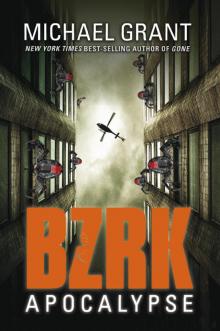 BZRK: Apocalypse
BZRK: Apocalypse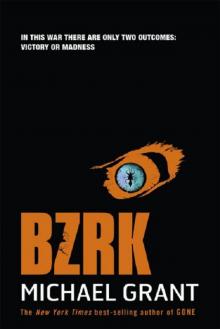 Bzrk
Bzrk Love Sucks and Then You Die
Love Sucks and Then You Die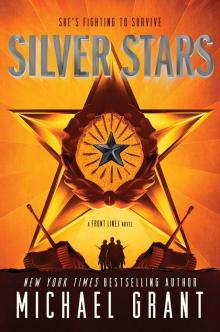 Silver Stars
Silver Stars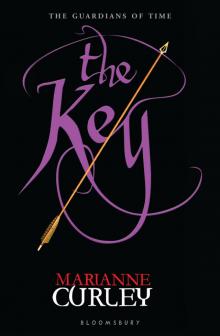 The Key
The Key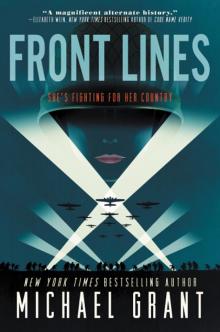 Front Lines
Front Lines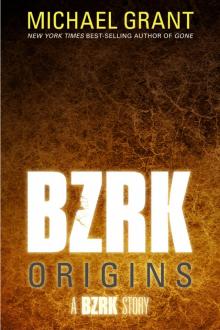 BZRK Origins
BZRK Origins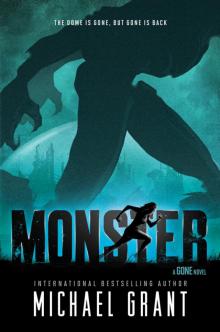 Monster
Monster Gone
Gone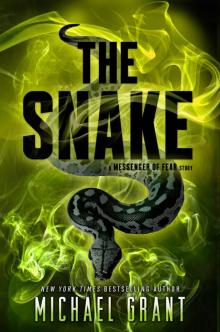 The Snake
The Snake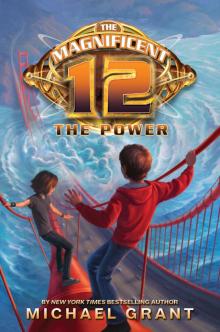 The Power
The Power Hunger
Hunger Lies
Lies A Sudden Death in Cyprus
A Sudden Death in Cyprus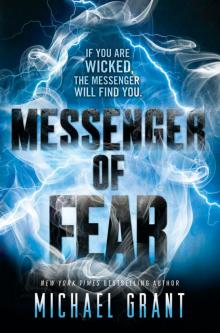 Messenger of Fear
Messenger of Fear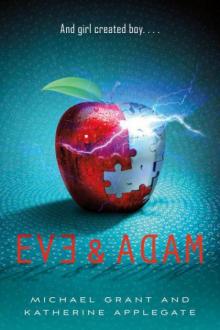 Eve & Adam
Eve & Adam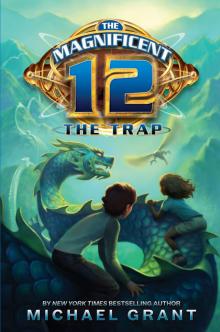 The Trap
The Trap Light
Light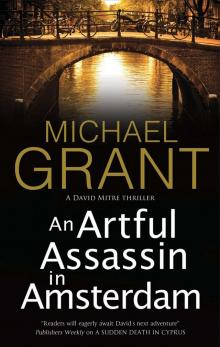 An Artful Assassin in Amsterdam
An Artful Assassin in Amsterdam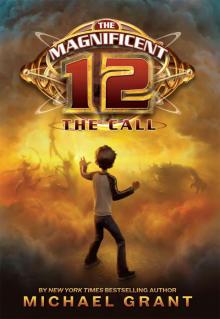 The Call
The Call Hero
Hero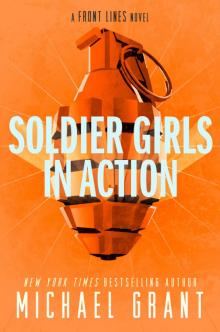 Soldier Girls in Action
Soldier Girls in Action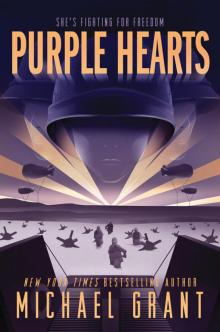 Purple Hearts
Purple Hearts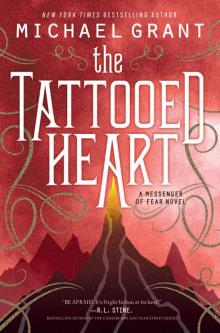 The Tattooed Heart
The Tattooed Heart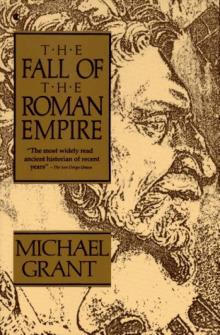 The Fall of the Roman Empire
The Fall of the Roman Empire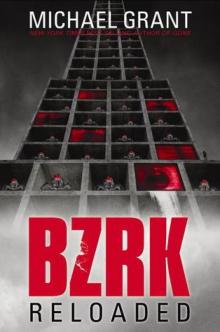 BZRK Reloaded
BZRK Reloaded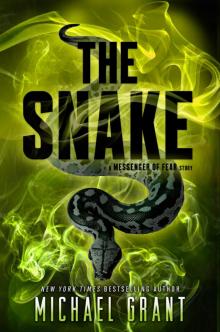 Messenger of Fear Novella #1
Messenger of Fear Novella #1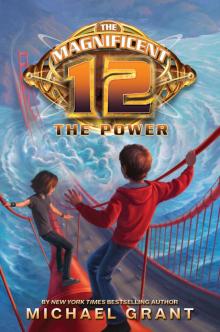 The Magnificent 12
The Magnificent 12 Fear: A Gone Novel
Fear: A Gone Novel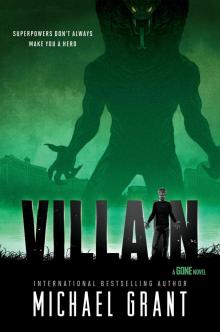 Villain
Villain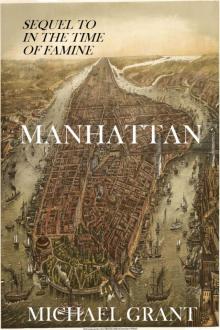 Manhattan
Manhattan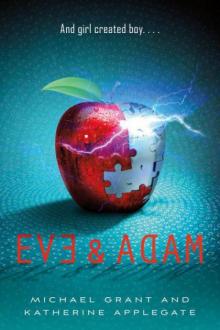 Eve and Adam
Eve and Adam Plague: A Gone Novel
Plague: A Gone Novel Fergie Rises
Fergie Rises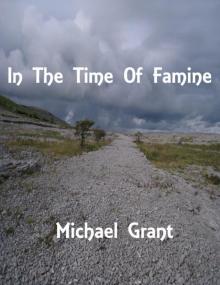 In the Time of Famine
In the Time of Famine Hunger_A Gone Novel
Hunger_A Gone Novel Lies g-3
Lies g-3